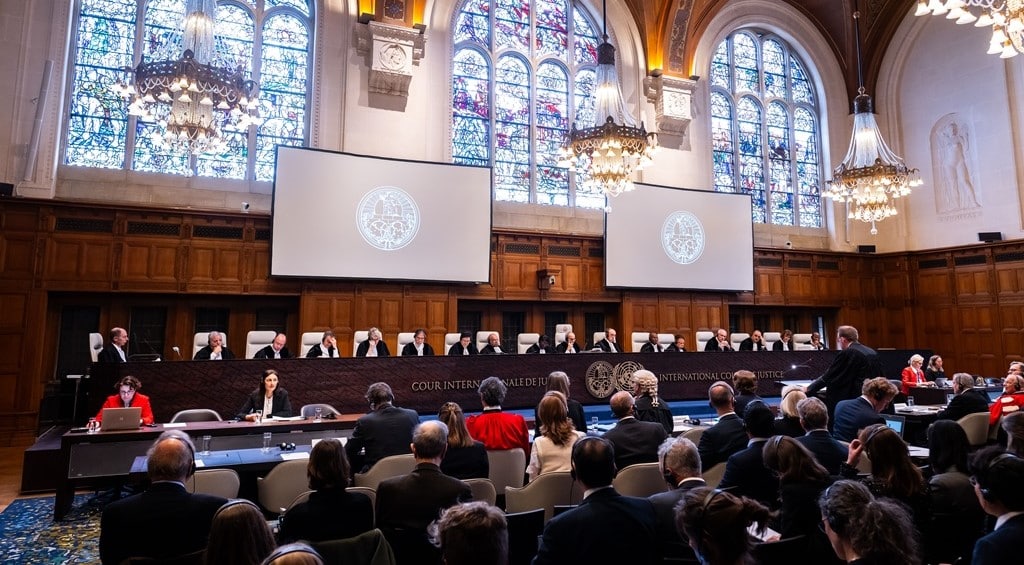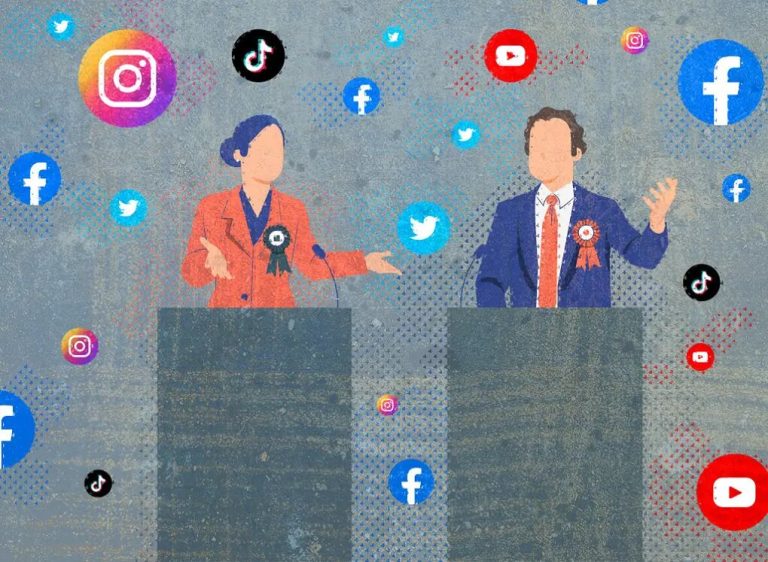20 de mayo 2021

ICJ Rules Against Nicaragua's Request For Germany to Halt Arms Sales to Israel

PUBLICIDAD 1M
PUBLICIDAD 4D
PUBLICIDAD 5D
Through social networks, pre-candidates broadcast their content, in a strange political campaign, gripped by repression and the pandemic

Through social networks
Without free streets or stools to climb and share their ideas, without the valuable face-to-face greeting or house-to-house visits, without televised political debates, the presidential pre-candidates face the strangest of Nicaragua's political campaigns, gripped by government repression and the pandemic.
Without masses in the streets threatened by gunmen, social networks are the only platfom available to broadcast political discourse, receive it, support it, spread it, know it, reject it, or criticize it. The pre-candidates and Nicaraguan society cling to it like castaways, embracing the piece of wood in the middle of a storm, preparing to vote in the elections scheduled for November.
And so, we have pre-candidates issuing more proselytizing content on social networks in the last month, and people engaged in the political debate, giving "likes" and commenting, rejecting and approving. There is a phenomenon of pre-candidates launching a tweet and dozens of tweeters commenting, in an activity that could simulate a real life political assembly in some neighborhood of this territory currently besieged by the police of the Ortega regime. There are also simulations of political debates between groups of supporters following events involving their candidates.
The social networks most used by the pre-candidates and their supporters for their campaigns are Facebook and Twitter, Instagram to a lesser degree, and Tik Tok, YouTube, blogs, web, radio (podcast) and virtual meetings via zoom to an even lesser degree. That is in public, because in private, the activity is frenetic: WhatsApp and Telegram are also used to disseminate textual, visual and audio content to their supporters; especially for the political organization of the pre-candidates campaigns, that gear of detail is important to fine-tune political communication campaigns.
On Facebook, the network that accumulates the largest number of registered accounts in the country, with almost three and a half million accounts (note that each person could have one or more accounts on this network), is where the pre-candidates have personal profiles and candidate pages, in addition to groups of friends who open spaces for them to promote themselves. This is how Facebook activity is observed:
According to the data provided by the Metricool application, in the period from April 3 to May 2, there is a sustained growth of followers in the public pages of Felix Maradiaga, Arturo Cruz, Medardo Mairena and Cristiana Chamorro; Juan Sebastian Chamorro grows to a lesser extent, and almost no growth for Miguel Mora. It must be taken into account that we cannot measure the growth of followers in private groups and personal profiles, since Facebook does not allow it as it is private information.
On their personal profiles, Mora’s and Maradiaga’s followers are in the thousands. Mora's account has 74,253 followers, which he started accumulating when he was a journalist, then a political prisoner and now a pre-candidate. Maradiaga's account reaches 60 094 followers. Another notable number is that of Cristiana Chamorro's group of friends, which was created to follow the pre-candidate and reaches 27,000 followers.
The case of Medardo Mairena, whose page reaches 19 044 followers and was born in July 2018 in the heat of the political protests, and subsequent imprisonment and torture by the regime, is notable. Also, the case of the pre-candidate Arturo Cruz, whose page was born in February 2021 and has sustained growth with 1947 followers.
The sympathy that the pre-candidates awaken in their supporters can be measured by the term "engagement", used by the applications. The term intends to measure the passion, love and feelings aroused in the followers through clicks, "likes", shares and comments. The sum of this activity is understood as "engagement and loyalty".
We will refer to this measurement as communicative interaction, since we observe the followers and pre-candidates as political actors in the midst of a social and political practice, such as an electoral campaign and political communication, rather than in a commercial relationship of product for sale and buyer.
This communicative interaction indicates the degree of involvement that supporters have with their pre-candidates, acting with almost all or all the options offered by the social network to express themselves: someone who shares, gives "likes", comments and watches the video, for example, is someone very committed to the pre-candidate.
This is the degree of communicative interaction of followers with their pre-candidates, according to Metricool:
As can be seen in the graph, the highest ratio of communicative interaction is for pre-candidate Cristiana Chamorro with 106.45, doubling and tripling the others. This means that of the total number of Chamorro's followers, they like, share and comment with faithful assiduity: they communicate more with her publications. The followers of others also act, although they use the options offered by the social network to a lesser extent.
This may be due to the fact that this interaction occurs on other sites, such as, for example, the personal profile of the pre-candidate.
While on the social network Twitter, the activity is manifested in the following way:
For now, pre-candidates Miguel Mora and Felix Maradiaga have the highest number of followers on twitter: 88 600 and 70 500 respectively. They are followed in order of number of followers by Juan Sebastián Chamorro with 32,500; Cristiana Chamorro with 14,400; Medardo Mairena with 8081; Américo Treminio with 5048; George Henríquez Cayasso with 2681; Arturo Cruz with 1958; and Noel Vidaurre with 115. There are no public Twitter accounts for pre-candidates Luis Fley and María Eugenia Alonso.
We have verified that there are many Nicaraguan Twitter accounts that are hiding their accounts using virtual private networks (VPN) or accounts with pseudonyms due to political repression, so we can deduce that the numbers presented in the graph above could be higher for all the pre-candidates if there is an environment of free communicative interaction.
The high number of followers in any of the social networks does not mean greater sympathy. In fact, there are cases of pre-candidates with a high number of followers who get few hearts and few "likes" in the communicative interaction. In Nicaragua, we have cases of pre-candidate accounts that were born with an identity, for example "political prisoner" and that aroused much solidarity, and now with their new identity of "pre-candidate of one of the groups", the sympathies are diluted.
In view of the high number of followers that the pre-candidates have on Facebook and Twitter, it is striking that the activity on Instagram is low, despite the fact that it is the second network with more registered users in the country.
The activity of the pre-candidate Felix Maradiaga (7236 followers) on Instagram is notable, making him better positioned in the use of social networks to amplify his political discourse. He doubles Miguel Mora who has 2432 followers and quintuples or leads the others, as can be seen in the previous graph. Both pre-candidates, moreover, adapt their content to this social network that is characterized by personal life narratives and political interests of its users, although they still fail to provide content with the "instagrammer" style, which is enlightened, bucolic, reflective and romantic using very good photographs that attract the followers of the network.
The degree of activity of the pre-candidates is lower on other social networks, although it is valuable to note that the intention to use other social networks indicates the search for and finding of sympathizers in other age groups.
Only Juan Sebastián Chamorro and Arturo Cruz have their own blogs and websites. Maradiaga and Cruz have Wikipedia pages. The only one with a YouTube channel is Miguel Mora, although this comes from the original Canal 15 account and it would not be accurate to correspond the high number of followers he obtained as a media outlet -he has 64,700 subscribers- with his new role as a politician and candidate now. Although it is useful for the exposure effects Mora needs for his videos.
Maradiaga has a weekly appointment on Radio Corporación with open microphone, and Juan Sebastián Chamorro does zoom meetings by previous registration. Maradiaga and Cruz make a notable effort to have a presence in the Tik Tok network, whose dynamics is a challenge for politicians of any country: Cruz has 40 followers and Maradiaga has 243. For now, both limit themselves to uploading videos and are not using the variety of formats offered by this network.
For this electoral campaign using social networks, the challenges are enormous. All the political actors that are integrated in the electoral period are affected due to the political repression that prevents the use of public squares and freedom of expression: the media and journalists to follow up by interviewing people and organizing political debates, the pre-candidates to meet with their supporters, the commercial brands to advertise in the media and expose their products in the spaces of greater audience, the communication and advertising agencies to manage political communication and energize with political marketing to the pre-candidates and the society in general to freely exercise their political communication in the electoral campaign period.
The political activity of an electoral campaign which only uses social networks cannot replace the political activity of an electoral campaign practiced person to person. In a normal situation, the activity of social networks would accompany the political activity exercised physically. That is why the pre-candidates and their supporters could put more pressure on the Government to lift the police state. And the regime - whose candidate, Daniel Ortega, does not have his own presence on any social network - should decide once and for all to confront the electoral candidates in fair law.
This article was originally published in Spanish in Confidencial. It has been translated by Ana María Sampson
Archivado como:
PUBLICIDAD 3M
PUBLICIDAD 3D